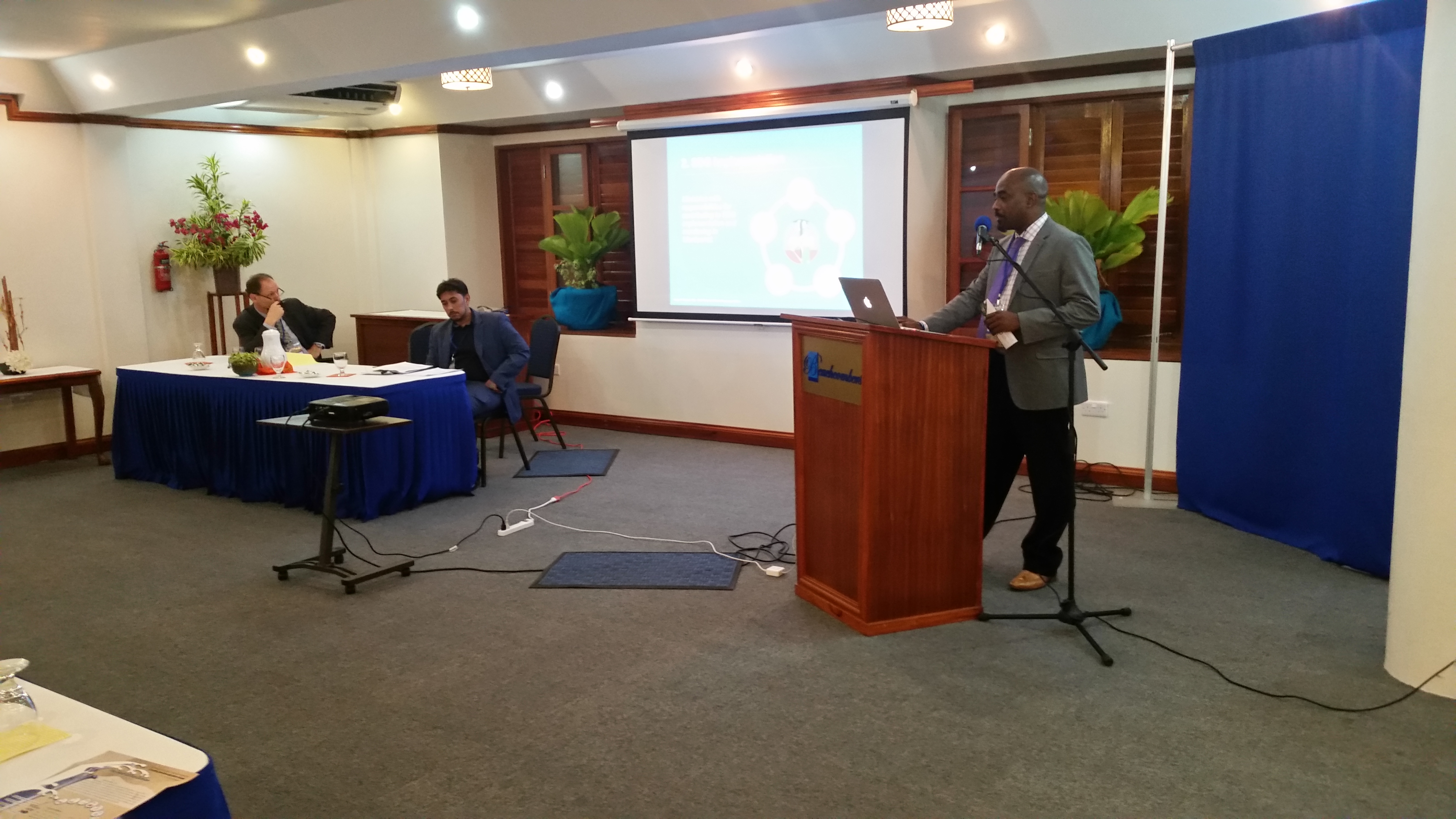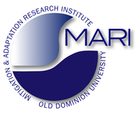Implementing and Monitoring the Sustainable Development Goals in the Caribbean: The Role of the Ocean
Session 1: The 2030 Agenda for Sustainable Development in Caribbean Small Island States
Co-Chairs: Jai Rampersad, Dr. Julian Roberts
This session facilitated a dialogue between governments and people of the Caribbean SIDS about the challenges of executing the 2030 Agenda in each of the SIS. Linking to “Geo space for SDGs” (GSSDG) for the implementation brought a local perspective into the deliberations. The first two presentation presented the efforts made by the governments in Montserrat and the British Virgin Islands, and the next presentation gave an overview of the work of a local NGO in Saint Vincent and the Grenadines. Subsequently, the three panelists provided insight into the challenges and efforts from the point of view of UN agencies and regional intergovernmental organizations.
The presentations and panelist statements provided answers to questions including: What are the core challenges? Who is doing what? What are the responsibilities? What knowledge is needed? Where is knowledge on the ocean needed? What data is used and what gaps are known? What science support is available?
At the end of the session, a common understanding of the core problems started to emerge, and knowledge needs to address these problems were identified.
Presentations
Alwyn Ponteen, Government of Montserrat, pointed out that Montserrat being an overseas territory of the U.K. is not considered a SIDS. It has a “Sustainable Development Plan (SDP) 2008-2020” that was developed within the framework of the Millennium Development Goals (MDGs). Being an overseas territory Montserrat. This SDP has the overarching planning and policy document to guide Montserrat to a future of sustainable development. Today, several ministries are involved in the SDG implementation. There is a challenges with transition in ministers, a lack of continuity with policy makers and the ministries working in silos. There is also a lack of clear priorities or competing priorities and limited capacity for evidence-based policy making. Data sharing can be an issue and funding (60% subsidized by the UK) can be limited. A three step approach is used for improving governance, management & sustainable utilization of Montserrat’s ocean resources to achieve SDG 14 Targets. As a case study, he presented a gap analysis related to fisheries and the sustainable use of marine resources in Montserrat. Necessary steps include the improvement of legal framework for sustainable management, governance and use of the ocean resources; enhanced data collection and management infrastructure systems; and the transfer expertise and skills from the South Atlantic UK Overseas Territory to Montserrat.
 |
Mr Alwyn Ponteen, government of Montserrat, underlined the importance of a global community approach for implementation of the 2030 Agenda in small societies as the one in Montserrat. |
Joseph Smith Abbott, government of the British Virgin Islands (BVI), emphasized the radical change caused by the 2017 hurricanes and outline the impact this has on the implementation of the SDGs. The loss of roughly 25% of the population and most of the islands' infrastructure requires a thorough recovery plan, which is currently in the public domain for comments. An important questions is how to build resilience for a future where such extreme events continue to occur. The theoretical framework for this appears to be available but implementing it in a real-world case is a totally different challenge. The vision of the BVI for recovery “is a stronger, smarter, greener and better BVI that is more resilient and sustainable. That means a BVI that is economically vibrant, socially cohesive, environmentally sustainable, structurally resilient and adhering to the principles of good governance and the rule of law.” Mr Smith Abbott emphasized the ecosystem threats resulting from extreme events, including among others high sea surface temperature causing coral bleaching, terrestrial pollution, sand mining and onshore developments. The development of a Blue Economy is important, and BVI is looking into a transition of the current economic fisheries zone into an economic exclusive zone. The BVI do not have an ocean governance and are looking into identifying who the key stakeholder would be for regional and international partners. He reported on a several activities to support implementation of the SDG 14, including natural capital assessments articulated by the UK Joint Nature Conservation Committee (JNCC) and considered how they would be integrated SDG planning and implementation.
Dr. James Lord, Sustainable Grenadines Inc. (SusGre), provided a view from a local NGO. SusGre found the Grenadines network of Marine Protected Areas (MPAs) and produced a multi-use zone for the Grenadines. SusGre also coordinates biophysical monitoring across these MPAs and completed and assessment of ecosystem health in the Grenadines. He pointed out issue with microalgae growth and low herbivorous fish populations. SusGre has a focus on education and provides training to MPA personnel, including a Junior Ranger program, training for fisherfolk in drop-line fishing, and use of lobster pots, and engages in social marketing campaign. As an example of challenges from infrastructure developments, he illustrated the impact of failed marine construction on Ashton Lagoon. SusGre is looking for partnerships at regional level and for national support for projects. Ideas for collaborations include the multi-use zoning plan that could be considered for marine spatial planning in other countries, sustainability of offshore fisheries research, and effective approaches to tackle nutrient pollution in the Grenadines. Collaboration could also help to spread the use of educational resources.
|
|
Dr. James Lord, Sustainable Grenadines Inc. illustrated the benefits of network collaboration for the collection of comprehensive environmental data. |
Panel Discussion
The Panelists include Christopher Corbin (UN-CEP), Lorenzo Harewood (UNDP) and Milton Haughton (CRFM). It was moderated by Dr Julian Roberts (Blue Resources, U.K.) and Jai Rampersad (RHUM Box LTD, Trinidad). The Panel considered the presentations made by Mr Alwyn Ponteen (Montserrat), Mr Joseph Smith Abbott (BVI) and Mr James Lord (Sustainable Grenadines).
|
|
The Panel on regional challenges in SDG implementation and monitoring include (from right) Christopher Corbin (UN-CEP), Lorenzo Harewood (UNDP), Dr Julian Roberts (Blue Resources, U.K.), Milton Haughton (CRFM), and Jai Rampersad (not in picture). |
Lorenzo Harewood, UNDP Barbados, explained that he works on poverty while supporting environmentally sustainable growth. He is looking at trends for poverty, financing for development, and economic shocks. Challenges in the region are the need to strengthen national capacity, awareness and ownership at national and local levels, and verifying priorities, and addressing budgetary and financial challenges.
Chris Corbin, UN Environmental Program, Jamaica, pointed out that his office provides function on behalf of the Caribbean as the Secretariat of Cartegena Convention. Capacity building and training is a primary focus. He identified a need for a more systematic analysis of what training is needed and how the training will be used after and indicated that there may be a need for institutionalized training at the national level. With respect to communication and awareness, he sees an increased use of social media and social science but also the question of how to distill important information out of the overload of information and how to get verified information for decision making. He recognized challenges in the fact that some countries have visions and goals related to the SDGs, while others don't. Different ministries have different priorities. Question related to how policies are being assessed and multidisciplinary approaches are developed, and how to break down those silos. He ephasized the need to talk the language of ministries of finance. Long-term sustainability is important and need to link to jobs. He also saw the need to incorporate ecosystem based management, i.e., connections between pollution, habitats, and fisheries.
Milton Haughton, CRFM, Belice, underlined the economic and community importance of the marine environment. Challenges arise from the uncertainty associated with climate change, ocean acidification, dead zones and deoxygenation, and coastal erosion. The changes in species distributions and fish stocks constitute challenges for traditional fisheries. The capacity for monitoring of activities and enforcement of regulations is limited. The complex system requires an understanding of the changes as a basis sound decision making. He suggested the inclusion of citizen science should be considered. He urged for an increase in cross sectoral governance for coastal and marine resources and pointed out that only 6 countries are parties to the UN fish stocks agreements, a key agreements for management of marine agreements. He also want a increased public support and involvement.
The Panel clearly recognized the fact that Caribbean countries are characterized by a large marine area to land area ratio, meaning that the marine areas represent a significant opportunity for development. The Panel identified a number of critical gaps and challenges facing the region, in terms of the implementation of the SDGs. A key challenge is the lack of capacity and the need for training and capacity building. This is felt across all sectors of the SDGs. In this regard, the Panel noted the importance of regional institutions in providing both capacity building and the provision of technical support.
This notwithstanding, there remain challenges in achieving full cooperation between different agencies, which is hampering the region’s ability to fully realize the potential that is available. Agencies still have a “silo mentality” and this needs to change. This manifests itself inter alia in a lack of an integrated response to address inter-related challenges. There are some good examples of how these challenges are being overcome but if we are to implement the SDGs holistically we need a more “strategic vision” that looks and both national and regional priorities and transcends sectoral interests.
The important role of education and communities was clearly identified by the Panel and it was felt that too little focus is given to the knowledge and role of local communities. It was recognized that we can’t continue Business as Normal and therefore there is a need to find a way to make the SDGs relevant to local communities, not just NGOs and decision makers. How do we make the SDGs LOCAL Development Goals?
The Panel also recognized that there is a need to change the focus of the messaging on SDGs to one centered on economic development. In this regard the Panel felt that a key stakeholder, that is often overlooked, should be the Minister of Finance, since it is they who have the ability to determine budget allocation and to understand the economic implications of different development pathways. There is a need to change the current focus to focus on “Development” more holistically.
In the specific case of fisheries, the Panel acknowledged the critical importance of this sector to coastal communities throughout the Caribbean. The sector struggles due to a number of significant challenges, including:
- Lack of capacity
- Poor governance leading to poor resource management practices
- Lack of data for decision-making
- Lack of monitoring and enforcement
The ongoing issue of IUU highlights the need for closer inter-agency and inter-country cooperation and collaboration, particularly at the regional level. There is also a need to reform the current regulatory frameworks to address legal gaps for enforcement.
The Panel recognized the critical need for science support for policy development. There is a need for the scientific community to better understand government decision and policy-making processes to better understand how science and research can inform policy development.
One key gap identified by the Panel relates to indicators and targets under the SDGs. The indicators for monitoring achievement of targets, particularly under SDG 14, are still largely missing. There is no conceptual framework or methodology for how to collect data to support monitoring if SDG implementation.
A key challenge is the lack of national frameworks for monitoring and evaluation of indicators. UNEP is looking at a region-wide framework under the Regional Seas Programme based on what indicators are routinely monitored and how these can link to improved governance.
Improving indicators is an iterative process with the need for capacity building and alignment. This highlights the important role that the scientific/research community can play in SDG implementation
RECOMMENDATIONS
- Need to focus on capacity building in the region and in sensitizing communities to the SDG’s and their importance to their daily lives;
- Need to develop national frameworks for monitoring and evaluation of SDG indicators. This must include the development of a suit of indicators, including addressing the Type III indicators. One option for this would be to use some local examples to demonstrate the application of satellite data to monitor certain indicators;
- Scientists/researchers need to be ‘educated’ in government policy-making mechanisms to better understand how their research can inform better policymaking. This would be a good role for regional institutions to facilitate;
- Develop a framework of indicators for SDG 14 – one suggestion presented ruing the workshop was simply to adopt the existing GOOS indicators.
This workshop was sponsored by:
 under grant 80NSSC17K0241 |
 |
 |
 |
 |